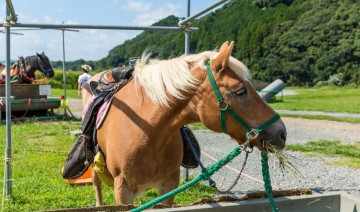{article.name}
Stay Informed
The Consequences of Vitamin E Deficiency in Horses

- Share this:
- Share on Facebook
- Pin on Pinterest
- Tweet on Twitter
Vitamin E is an essential part of a horse’s diet, and lacking vitamin E can lead to dire health consequences. By understanding vitamin E, where it is found, and how to safely supplement a horse’s diet with adequate vitamin E, you can help your horse healthy and avoid the consequences of vitamin E deficiency.
About Vitamin E
Vitamin E is a collective term for a related group of fat-soluble nutrients that serve as powerful antioxidants, protecting cells from free radical damage, particularly muscle and nerve cells. Vitamin E also lowers the risk of chronic diseases and supports a horse’s healthy immune system.
Vitamin E is naturally found in fresh, new, green grass. Horses take in vitamin E as they forage, and with a lush pasture, horses may never have any problems with inadequate vitamin E. If horses are only turned out in a poor pasture or subsist on a diet of mostly dried hay, however, they can become vitamin E deficient. After hay and grasses are cut any vitamin E in the plants will degrade, and older hay has less of this critical vitamin than freshly cut hay. If a horse does not have a varied diet that includes adequate fresh grasses, vitamin E deficiency can be a very real and dangerous risk.
Symptoms of Vitamin E Deficiency in Horses
A wide range of symptoms may indicate a lack of vitamin E in a horse’s diet. Typical symptoms include…
- Gait abnormalities
- Dry or damaged coat
- Muscle weakness or trembling
- Prolonged laying down
- Rapid heartrate
- General stiffness or lethargy
- Loss of muscle mass or condition
- Toe dragging
- Low head carriage
- Slow illness recovery
Because these symptoms can be vague and may be present for a variety of different illnesses, a blood test is necessary to determine a horse’s vitamin E levels. If vitamin E is dramatically lacking, the horse could develop dangerous and debilitating illnesses, including…
- White muscle disease
- Equine motor neuron disease
- Equine degenerative myeloencephalopathy
- Sporadic exertional rhabdomyolysis
Whether or not an individual horse will be susceptible to these diseases will depend not only on the degree of vitamin E deficiency in the animal’s diet, but also on its overall health, general condition, age, and activity level. In general, older horses require more vitamin E in their diet, as do breeding mares. Horses that are under harder training or working schedules also need more vitamin E and could develop deficiencies more quickly with a poor diet.
If your horse shows signs of vitamin E deficiency, contact your veterinarian immediately for a blood test and a thorough nutritional analysis. This will help determine not only the level of vitamin E the horse needs, but also whether or not other dietary adjustments are necessary for the healthiest nutrition.
Supplementing Your Horse’s Vitamin E
If your horse does need to increase its vitamin E intake, several options are available. Giving the animal additional access to high quality pasture is the optimum choice so the horse can intake the nutrient naturally. If that is not possible, however, switching to higher quality hay that has been cut more recently can provide more vitamin E. Hay should be stored in dark, dry locations to minimize vitamin E degradation. If necessary, fortified feed can be added to your horse’s diet for greater amounts of vitamin E, and both powdered and liquid vitamin E supplements are available. Before adding supplements to the feed, however, consult your veterinarian for guidance based on your horse’s exact nutritional needs, health condition, and weight to be sure the vitamin amount is appropriate but not too much, which could lead to different health problems and toxicity.
Vitamin E provides critical protection for a horse’s musculature and nervous system, and it is important to provide your horse with an adequate amount of this nutrient. With proper forage, good quality hay, and supplements if necessary, you can be sure your horse has enough vitamin E and will maintain good health for a long, productive life.
Special Offers
We are constantly adding new specials to our site. Be sure to check back often!


Comments